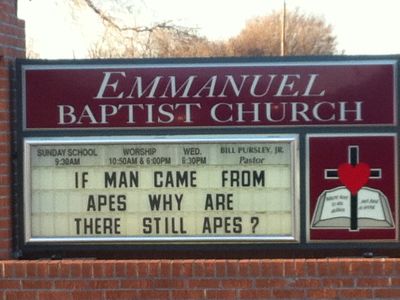Local Church Misunderstands Evolution - Why Are There Still Apes?
My wife spotted an interesting message on a sign out in front of one of the churches here in town. So, she took a picture of it and texted it to me.

For anyone that can't download images, here's the message.
IF MAN CAME FROM APES WHY ARE THERE STILL APES?
I've been seeing this as a parody of creationists for so long, that it's almost a bit surreal to see someone actually using it seriously. And it's not just some random commenter on a blog, but the message a church is putting out to the public. Even if the sign person at the church has enough freedom where the message doesn't have to get approved by someone else first, my wife tells me that the message has been up for over a week - plenty of time for someone in the congregation to say something about it.
I could just point and laugh at the sign, which may even have been enough for this entry, but that's not very productive. So, while I've covered this on the blog before, since the prior coverage was brief, I'll go through again explaining why this question sounds silly once you actually understand evolution. Since I have covered this before, some of the content below has been copied copiously from a previous post.
One of the easiest ways to see the error in this line of thinking is to use an analogy. I'll use myself as an example. My great great grandfather and grandmother on one side were German - not just of German ancestry, but born in Germany and immigrants to the U.S. So, I can quite literally say that I am descended from Germans. But it's also quite obvious that I'm not descended from any living Germans. A certain group of Germans and I share a common ancestry through my great great great grandparents. The descendants of my great great great grandparents split into two lineages - one that continued in the U.S., and one that continued in Germany. That lineage in Germany is composed of my cousins, not my ancestors.
Another way to see the error in this line of thinking is to pose it with a different group of animals. It's a bit like asking, 'If crows evolved from birds, why are there still birds?'
It's a very similar case with us and chimpanzees and bonobos. Around 6 million years ago, there was a population of apes that was neither human, chimpanzee, nor bonobo. Over the generations, this population split into multiple lineages, each of which evolved independently. Most of those lineages have gone extinct, but there are still three of us left. We are cousins. We can go back further in time and find the ancestor that we share with gorillas, and further to find the ancestor we share with orangutans, and on and on all the way back till life began. None of those ancestors will look exactly like any of their modern descendents, since evolution has been occurring in all of the lineages. (Obviously, we haven't actually found fossils of all species that have ever existed. But, in the same way that you know you must have a great great great great great great grandmother, even if you don't have any record of her, we also know that we must have common ancestors with Earth's other organisms, even if we haven't yet found their fossils.)
I think there's another misconception associated with this assertion. I think it goes back to the Great Chain of Being, where people feel that evolution is directed, and that us humans are the pinnacle. That's not the case. Much of the change that occurs in evolution is through mutation and natural selection (though those aren't the only drivers). Mutation is random. It just happens, without any conscious intent. Think about yourself - did you pick any of the mutations that make your DNA slightly different from your parents? Did you pick any of the mutations that make your children's different from yours? Natural selection isn't random. It acts like a filter - eliminating the mutations that don't work as well, while allowing the ones that do to pass through. But it's only a filter. It relies on the raw material from random mutations.
It's also important to keep in mind that mutations aren't good or bad on their own. It all depends on the environment an organism is living in, the animals lifestyle, and other factors. DNA to make gills is very useful for a fish, but wouldn't do a damn for us.
So, let's go back to that ancestral population of apes. Somehow, it got split into at least two lineages. Those lineages, once they became reproductively isolated, could no longer share DNA between each other. So, whatever beneficial mutations popped up in one population would have been available only in that population. Any mutations that made the eventual chimp lineage better at climbing trees, for example, would have been unavailable to our lineage. Likewise, any mutations that made or lineage better at walking on the ground would not have been available to the lineage that led to chimps & bonobos. So, once that population was split, the two lineages went their own separate evolutionary ways.
Environment could also have played a role. Now, I doubt the following is exactly what happened, but it's an interesting thought experiment. What could have caused that ancestral population to become split? Imagine that it was a new river, that cut through their range. Imagine that the river became so big that the ancestral apes couldn't cross it. And suppose that on one side of the river, the forest stayed largely intact, while on the other side, the forest gave way to savannah. Now, with one lineage living in forest, and the other in savannah, you can see how natural selection would have favored different mutations in each of the two lineages, causing each to evolve markedly differently.
So, once you understand a bit about how evolution works, the question 'If man came from apes, why are the still apes?' seems nonsensical, and even a bit silly.
Here's a related blog entry I wrote a few years ago:
Why Do People Have a Problem With Our Relation to Other Apes?
That entry also addresses the semantics of this a bit. In my opinion, we are just a type of ape, so saying that we evolved from apes just seems obvious.

 Here's a hell of an idea. A philosopher, Alain de Botton, who already has earned a bit of a questionable reputation for saying that
Here's a hell of an idea. A philosopher, Alain de Botton, who already has earned a bit of a questionable reputation for saying that  A little while back, I wrote an entry titled
A little while back, I wrote an entry titled  At Cranston High School West in Rhode Island, there was a mural painted to look like a banner with a prayer on it. For reference, here's the full text of the prayer (per
At Cranston High School West in Rhode Island, there was a mural painted to look like a banner with a prayer on it. For reference, here's the full text of the prayer (per  I got a link to an interesting article recently,
I got a link to an interesting article recently,  I'm back from the holidays. I know I didn't get anything posted last week, but that's because I was off from work all last week spending time with my family. And I don't really have anything big for this week because I've been so busy at work. But at least this entry is something.
I'm back from the holidays. I know I didn't get anything posted last week, but that's because I was off from work all last week spending time with my family. And I don't really have anything big for this week because I've been so busy at work. But at least this entry is something.